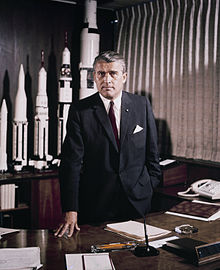Wernher von Braun
Appearance
(Redirected from Werner von Braun)

Wernher Magnus Maximilian Freiherr von Braun (23 March 1912 - 16 June 1977) was a German and American aerospace engineer and space architect. He was a member of the Nazi Party and Allgemeine SS, as well as the leading figure in the development of rocket technology in Nazi Germany and later a pioneer of rocket and space technology in the United States.
Quotes
[edit]

- The rocket worked perfectly, except for landing on the wrong planet.
- Remark to a colleague after the first V-2 rocket hit London (September 1944), as quoted in Apollo in Perspective : Spaceflight Then and Now (1999) by Jonathan Allday, p. 85
- We knew that we had created a new means of warfare, and the question as to what nation, to what victorious nation we were willing to entrust this brainchild of ours was a moral decision more than anything else. We wanted to see the world spared another conflict such as Germany had just been through, and we felt that only by surrendering such a weapon to people who are guided by the Bible could such an assurance to the world be best secured.
- Press statement after surrendering to U.S. Forces (May 1945)
- Basic research is what I am doing when I don't know what I am doing.
- In an interview in the New York Times (16 December 1957), cited in a footnote on page 32 of "Work, Society, and Culture" by Yves Reni Marie Simon, and also in a footnote (in German) on page 360 of "Vita activa oder Vom tätigen Leben" by Hannah Arendt (1981)
- Variants:
- Basic research is when I'm doing what I don't know I'm doing.
- Research is what I'm doing when I don't know what I'm doing.
- Basic research is what I am doing when I don't know what I am doing.
- Everything in space obeys the laws of physics. If you know these laws, and obey them, space will treat you kindly. And don't tell me that man doesn't belong out there. Man belongs wherever he wants to go — and he’ll do plenty well when he gets there.
- As quoted in Time (17 February 1958)
- We can lick gravity, but sometimes the paperwork is overwhelming.
- "On Bureaucracy", Chicago Sun Times (10 July 1958), as quoted in Gaither's Dictionary of Scientific Quotations, 2nd edition (2012), by Carl C. Gaither and Alma E. Cavazos-Gaither, editors, p. 925
- There is just one thing I can promise you about the outer-space program: Your tax dollar will go farther.
- Attributed in Reader's Digest (1961), and The Yale Book of Quotations (2006) edited by Fred R. Shapiro, p. 101
- If our intention had been merely to bring back a handful of soil and rocks from the lunar gravel pit and then forget the whole thing, we would certainly be history's biggest fools. But that is not our intention now — it never will be. What we are seeking in tomorrow's trip is indeed that key to our future on earth. We are expanding the mind of man. We are extending this God-given brain and these God-given hands to their outermost limits and in so doing all mankind will benefit. All mankind will reap the harvest. … What we will have attained when Neil Armstrong steps down upon the moon is a completely new step in the evolution of man.
- Banquet speech on the eve of the Apollo 11 launch, Royal Oaks Country Club, Titusville (15 July 1969); quoted in "Of a Fire on the Moon", LIFEmagazine (29 August 1969), 67, No. 9, p. 34
- I'm convinced that before the year 2000 is over, the first child will have been born on the moon.
- Taped TV interview, broadcast on WMAL, Washington, (7 January 1972), as reported in "Birth of Child on Moon Foreseen by von Braun", New York Times (7 January 1972), p. 14
- For me, the idea of a creation is not conceivable without invoking the necessity of design. One cannot be exposed to the law and order of the universe without concluding that there must be design and purpose behind it all.
- From a letter to the California State board of Education (14 September 1972)
- My experiences with science led me to God. They challenge science to prove the existence of God. But must we really light a candle to see the sun?
- From a letter to the California State board of Education (14 September 1972)
- It is in scientific honesty that I endorse the presentation of alternative theories for the origin of the universe, life and man in the science classroom. It would be an error to overlook the possibility that the universe was planned rather than happening by chance.
- From a letter to the California State board of Education (14 September 1972)
- Can a physicist visualize an electron? The electron is materially inconceivable and yet, it is so perfectly known through its effects that we use it to illuminate our cities, guide our airlines through the night skies and take the most accurate measurements. What strange rationale makes some physicists accept the inconceivable electrons as real while refusing to accept the reality of a Designer on the ground that they cannot conceive Him?
- In letter to California State board of Education (14 September 1972)
- The materialists of the nineteenth century and their Marxist heirs of the twentieth, tried to tell us that, as science gives us more knowledge about the creation, we could live without faith in a Creator. Yet so far, with every new answer, we have discovered new questions. The better we understand . . . the master plan for the galaxies, the more reason we have found to marvel at the wonder of God’s creation.
- As quoted in "Basis for an Assured Faith", in The Watchtower magazine (15 June 1981)
- In this age of space flight, when we use the modern tools of science to advance into new regions of human activity, the Bible ... this grandiose, stirring history of the gradual revelation and unfolding of the moral law ... remains in every way an up-to-date book. Our knowledge and use of the laws of nature that enable us to fly to the Moon also enable us to destroy our home planet with the atom bomb. Science itself does not address the question whether we should use the power at our disposal for good or for evil. The guidelines of what we ought to do are furnished in the moral law of God. It is no longer enough that we pray that God may be with us on our side. We must learn again that we may be on God's side.
- As quoted in Phillips' Book of Great Thoughts & Funny Sayings (1993) edited by Bob Phillips, p. 42
Responsible Scientific Investigation and Application (1976)
[edit]

- Address delivered to the Southeastern Pennsylvania Synod of the Lutheran Church in America, as published in The Nature of a Humane Society : A Symposium on the Bicentennial of the United States of America (1977) edited by Hans Ober Hess, p. 97
- The body of knowledge is advancing at an absolutely incredible rate, and new tools are constantly being made available to the researcher that were previously not only unavailable, but often not even dreamed of.
- Without wanting to seem overly partisan, I would like simply to point out that the space program has by all standards become America's greatest generator of new ideas in science and technology. It is essentially an organization for opening new frontiers, physically and intellectually. Today we live in a different world because in 1958 Americans accepted the challenge of space and made the required national investment to meet it.
Young people today are learning a new science, but even more importantly, they are viewing the earth and man's relationship to it quite differently — and I think perhaps more humanly — than we did fifteen years ago. The space program is the first large scientific and technological activity in history that offers to bring the people of all nations together instead of setting them further apart.
- One of the most disconcerting issues of our time lies in the fact that modern science, along with miracle drugs and communications satellites, has also produced nuclear bombs. What makes it even worse, science has utterly failed to provide an answer on how to cope with them. As a result, science and scientists have often been blamed for the desperate dilemma in which mankind finds itself today.
Science, all by itself, has no moral dimension. The same poison-containing drug which cures when taken in small doses, may kill when taken in excess. The same nuclear chain reaction that produces badly needed electrical energy when harnessed in a reactor, may kill thousands when abruptly released in an atomic bomb. Thus it does not make sense to ask a biochemist or a nuclear physicist whether his research in the field of toxic substances or nuclear processes is good or bad for mankind. In most cases the scientist will be fully aware of the possibility of an abuse of his discoveries, but aside from his innate scientific curiosity he will be motivated by a deep-seated hope and belief that something of value for his fellow man may emerge from his labors.
The same applies to technology, through which most advances in the natural sciences are put to practical use.- Comparable to remarks of William Masters, in "Two Sex Researchers on the Firing Line" LIFE magazine (24 June 1966), p. 49: "Science by itself has no moral dimension. But it does seek to establish truth. And upon this truth morality can be built."
- Variants:
- Science does not have a moral dimension. It is like a knife. If you give it to a surgeon or a murderer, each will use it differently.
- As quoted in Futurehype: The Myths of Technology Change (2009) by Robert B. Seidensticker
- Science does not have a moral dimension. It is like a knife. If you give it to a surgeon or a murderer, each will use it differently. Should the knife have not been developed?
- As quoted in Science & Society (2012) by Peter Daempfle, Ch. 6, p. 97
Quotes about von Braun
[edit]Tom Lehrer, in lyrics from "Wernher von Braun":
- "Once the rockets are up,
who cares where they come down?
That's not my department,"
says Wernher von Braun. - "In German or English,
I know how to count down,
und I'm learning Chinese"
says Wernher von Braun.
External links
[edit]- Marshall Space Flight Center History Office - Dr. Wernher von Braun
- Redstone Arsenal History Office - Dr. Wernher von Braun
- Marshall Space Flight Center History Office - The Disney-Von Braun Collaboration and Its Influence on Space Exploration
- The Institute for Cooperation in Space
- Photographs of Wernher von Braun's gravesite
Categories:
- 1912 births
- 1977 deaths
- Academics from Germany
- Academics from the United States
- People of Nazi Germany
- Technology writers from the United States
- Physicists from Germany
- Physicists from the United States
- Aerospace engineers
- Engineers from Germany
- Engineers from the United States
- Inventors
- Architects from Germany
- Architects from the United States
- Immigrants to the United States
- National Medal of Science laureates


